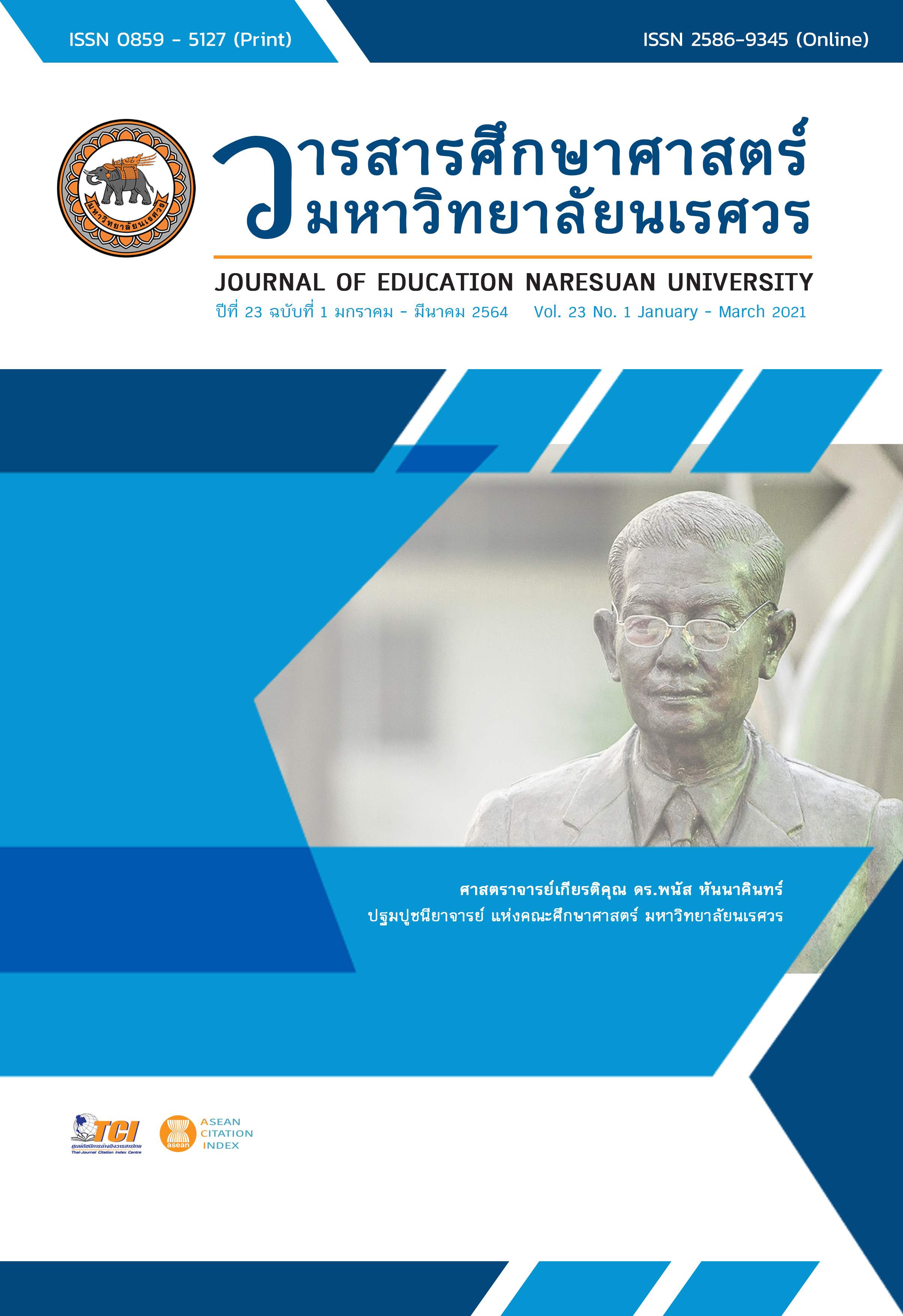A STUDY ON PARENTING STYLES IN CULTIVATING OF VIRTUES AND ETHICS FOR KINDERGARTENERS การศึกษาแบบแผนการอบรมเลี้ยงดูของผู้ปกครองในการปลูกฝังคุณธรรมจริยธรรมแก่เด็กอนุบาล
Main Article Content
Abstract
The purpose of this research was to study parenting styles in cultivating virtues and ethics in kindergarteners, specifically, by comparing three child-rearing approaches, namely, the Democratic Oriented Approach, Love and Support Oriented Approach, and Reason Oriented Approach. Data were collected through a combination of quantitative and qualitative methods. A questionnaire survey was carried out to collect data on "parenting styles", parental roles, and basic backgrounds, from a sample population of 92 respondents, which were subsequently scored on a 1 to 5 scale and analyzed using means, percentages and standard deviations. In-depth interviews were applied to collect information on parenting styles and on the processes of imparting virtues and ethics in preschool children. According to the survey result, the majority of families reported adopting the child-rearing approach that stressed love and support ( = 3.81). They usually expressed their sentiments through intimate acts of hugging and kissing. Among the families who were inclined toward democratic style (
= 3.28) of child-rearing, the focus was on fair judgement during fights among the children. Finally, the caregivers who opted for the reason oriented child-rearing style (
= 3.14) used reason when explaining potential danger of various items the children might play with. In addition, the in-depth interviews showed that all three types of families used various media, such as folktales, as part of the cultivation of virtues and ethics. In particular, the extended families tended to focus on instilling a sense of gratitude through setting examples and integrating in daily activities.
Article Details

This work is licensed under a Creative Commons Attribution-NonCommercial-NoDerivatives 4.0 International License.
The owner of the article does not copy or violate any of its copyright. If any copyright infringement occurs or prosecution, in any case, the Editorial Board is not involved in all the rights to the owner of the article to be performed.
References
Amornwiwat, S. (1994). "The moral of the story". Knowledge, virtue, integrity, ethics, and education. Bangkok: Chulalongkorn University. [in Thai]
Bandura, R. (1986). Social foundations of thoughts and action: A social cognitive theory. Englewood Cliffs. New Jersey: Prentice-Hall.
Chiengkul, W. (2010). Educational role and economic and social development. Retrieved January 27, 2018, from https://witayakornclub.wordpress.com/2009/11/18/5-การศึกษากับการพัฒนาเศรษฐกิจ/ [in Thai]
Chitayasothorn, D. (2009). Diana baumrind’s parenting styles. University of the Thai Chamber of Commerce Journal Humanities and Social Sciences, 29(4), 173-187. [in Thai]
Department of Juvenile Observation and Protection. (2017). Statistics from the year 2008-2011. Retrieved 10 January, 2018 from www.djop.go.th/stat/statbetween2008-2011 [in Thai]
Institute for Population and Social Research. (2013). Thai society and demographic change. Retrieved November 16, 2017, from http://www.ipsr.mahidol.ac.th/ipsrbeta/th/ResearchClusters.aspx?ArticleId=45 [in Thai]
Isanurag, S. (2006). Emotional and social development of children 6-12 years. Journal of Public Health and Development, 4(2), 89-100. [in Thai]
Jariyatotkorn, K. (2008). The role of parent in enhancing moral and ethical aspects to early childhood children (Master thesis). Bangkok: Suan Dusit University. [in Thai]
Jarus, S., & Yongkittikul, C. (2002). Relationship between parenting style and personal behavior among Thai adolescents. Bangkok: Silpakorn University. [in Thai]
Keawkungwan, S. (2008). Theories of personality psychology. Bangkok: Mohchaoban. [in Thai]
Kohlberg, L. (1976). Moral stages and moralization: The cognitive developmental approach. In T. Lickona (ed.), Moral Development and Behavior: Theory Research and Issues (pp. 36-53). New York: Holt, Rinehart and Winston.
Kotchabhakdi, N. J. (2000). Development of early childhood from fertility to 5 years Bangkok: National institute for early childhood education. Bangkok: Office of the Basic Education Commission. [in Thai]
Krejcie, R. V., & Morgan, E. W. (1970). Educational and psychological measurement. New York: Minnisota University.
Noipayak, P. (2013). Moral development. In Hansakunachai, T., Roongpraiwan, R., Sutchritpongsa, S., & Chonchaiya, W. (Eds.), Developmental and behavioral books volume 3 child health care (pp. 66-75). Bangkok: The Developmental and Behavioral Society of Thailand. [in Thai]
Pantoomnawin, D. (2008). Synthesis of ethical and moral research in Thailand and abroad. Bangkok: Center for the Promotion and Development of Moral Power. [in Thai]
Pantoomnawin, D., Choochom, O., & Wanintanong, N. (1985). Psycho-Ecological factors relating to child-rearing of Thai mothers (Research report). Bangkok: Srinakharinwirot University. [in Thai]
Peerayot, R. (2000). Early childhood nursing. Bangkok: Health Book Publishing. [in Thai]
Piaget, J. (1932). The moral judgment of the child. New York: Free Press.
Plubrukan, R. (2011). Bonding and attachment in children: Research to practice. In Hansakunachai, T., Roongpraiwan, R., Sutchritpongsa, S., & Chonchaiya, W. (Eds.), Developmental and Behavioral Books Volume 3 Child Health Care (pp. 11-18). Bangkok: Child Development and Development Club of Thailand. [in Thai]
Rotjanalert, N. (1990). The study of variables related to self-control of adolescent students (Master thesis). Bangkok: Srinakharinwirot University. [in Thai]
Toncharoenrat, A. (2011). Ethics for students. Journal of Education Naresuan University, 13(1), 207-224. [in Thai]
Techakomol, W. (1998). Selected factors affecting self regulated learning of secondary school students in Bangkok metropolis (Master thesis). Bangkok: Chulalongkorn University. [in Thai]
Thom-vanich, J. (2017). 4 Early childhood crisis the future of nation. Retrieved October 6, 2017, from https://www.matichon.co.th/publicize/news_685820-การศึกษา [in Thai]
Vorakitphokatorn, S., Pokpong, S., Yongyuan, B., & Musikaphan, W. (2009). Moral family. Bangkok: Center for the Promotion and Development of Moral Power. [in Thai]


